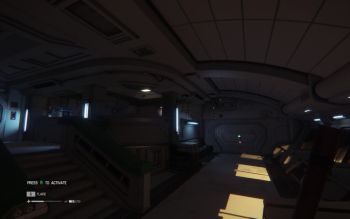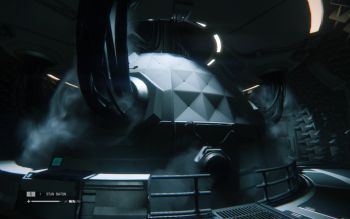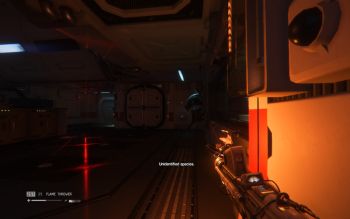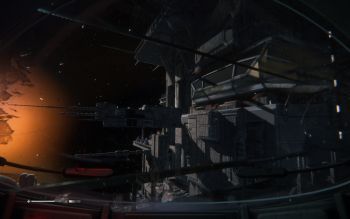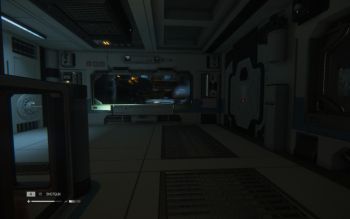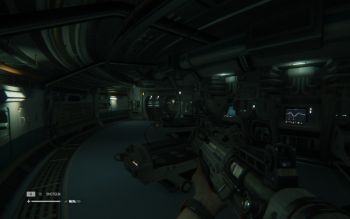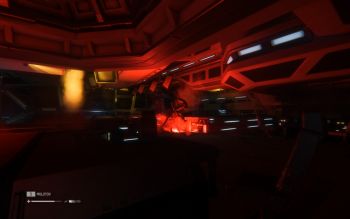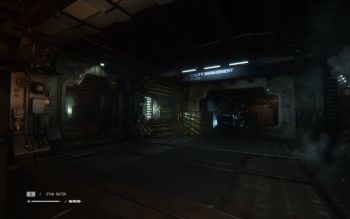Alien: Isolation
I could write a book about my experiences with this game. Once I started playing it about ten days ago, I couldn't get it out of my head.
I kept retracing the steps I had taken and then reading online how others had approached the same parts. I could remember more details about the maps than
with any other game: When the alien might drop in any minute, you start paying attention to your surroundings because that single
piece of furniture you would have walked right past in any other game might end up saving your life in Isolation.
Now, I may be biased because I'm a huge fan of the franchise, but that sure as hell didn't make me appreciate Colonial Marines. I saw Aliens
for the first time when I was around eight and I loved every minute of it; the same with Alien maybe a year later. These movies even ruined me for
other science fiction films like Star Wars. After having seen Aliens, how could I take a sci-fi movie with C3PO, Ewoks and Chewbacca seriously?
That's not real space; that's Disney space. (How fitting then that Disney recently acquired the franchise.) Anyway, after half a dozen Alien games
with colonial marines and pulse rifles, I couldn't wait for a game based on the first movie.
The game's protagonist is Amanda Ripley, Ellen's daughter. When she, as a grown woman, hears of the Nostromo flight recorder having been found, she heads for Sevastopol, a huge space station orbiting a gas giant, to find out what happened to her mother. Sevastopol is kinda like a Black Mesa in space: it's claustrophobic, seems to sprawl in every direction and feels like an actual location. Occasionally you get a glimpse of the station's exteriors through a window; its size never ceases to impress. Unfortunately, the station is being decommissioned and, naturally, there's an alien lurking around.
What's novel about this game is its take on the alien. While the previous games had tons of aliens, in this one it's just you and the alien playing cat and mouse around Sevastopol, which makes for a perfect setting for a game of this type. The alien itself has a remarkable AI. It will be unrelenting if you have given it a good reason: Allowing the alien to see you even once may weigh heavily in how it behaves for the rest of the map. If you play well, it might not show up for minutes. Sometimes the alien appears due to a scripted event (which is understandable) but the vast majority of encounters are organic; some might say random, but obviously there should be an element of randomness. Even if you're extremely careful, you cannot rely on the alien never showing up. You can minimize problems resulting from unpredictability by always having a backup plan such as a place to retreat to (or crawl under) or something useful from your inventory. Based on what I read after finishing the game, the alien can adapt to your tactics such as the distractions you use, but I used only three flares and two noisemaker throughout the game, giving the alien little opportunity to adjust. The AI has its quirks though: Upon encountering the alien, it seems that you're given a split second to break the line of sight. The alien cannot see you hiding under a desk (but may check there anyway) unless you can see the alien's upper body: Your body, in other words, doesn't seem to exist apart from the eyes. (This is actually a fair compromise since you can't control your entire body in video games the way you can in real life.) The alien also doesn't seem to react to doors opening which also makes sense given the layout of some of the maps. The alien isn't the only threat around. "Working Joe" androids can be just as relentless as the alien even if not as scary (but there's still something very unsettling about those blank expressionless faces and glowing eyes). You can easily outrun them, but in many situations this may lead to only more problems, especially if the alien is around. Sevastopol has hostile humans too; these are best fed to the alien.
The alien cannot be killed but there are ways to make it go away. Flares and noisemakers serve as temporary distractions without alerting the alien to your presence. Molotovs, pipebombs and the flamethrower buy some valuable time by causing the alien to retreat but it usually returns a few seconds later even more pissed off. To craft these items, you first need blueprints and then some components. When crafting items, you always have to consider the tradeoffs, especially on hard where components are scarce. There are firearms too but these are merely a tease. They do nothing against the alien but will attract its undivided attention. Compared to the movies, the alien is quite fair: Whether it's up in the vents or patrolling the hallways, it makes a lot of noise. The noise may strike fear like no other sound in video games ever before, but it's basically a lifeline to hang on to if you wish to survive. Unlike in the movies, the alien never attacks you out of nowhere. But just as the alien doesn't cheat, you cannot cheat the alien either: Just because you're in the middle of a hacking puzzle doesn't mean you won't get speared by the alien. Or just because you have already pushed the elevator button to exit the map doesn't mean you won't be dead a second later. And save points often sure as hell aren't safe.
Genereally speaking, the game has been critically acclaimed but some reviewers and players have had major issues with the difficulty level, dying over and over again without making any progress. In a particularly notorious review, IGN, the site that never misses an opportunity to praise the Call of Duty franchise, gave Isolation a pitiful score of 5.9/10. Haven't read the review? Want me to summarize it for you? Here's how it reads:

The problem with the likes of IGN's Ryan Mccaffrey is that he's a scrub, you know, like in the TLC song: "A scrub is a guy that thinks he's fly", while he's not. If you're a scrub, you start treating adversity and challenge that exceed your skill level as unfairness and seeing "design flaws" everywhere. That, after all, is easier for the ego to handle than accepting the fact that you are a scrub; and the alien eats scrubs for breakfast. It's kinda like those players on Battlelog who complain about an army of cheaters standing between them and a better kill-death ratio. In this case, the reviewer admits he died hundreds of times (on hard) and spent around 15-20 hours playing the game. I finished the game in 19 hours (there are 18 missions) and died around 20 times (with almost half of that total in just one map). If the reviewer died so much more often in roughly the same amount of time then he must have been trying to rush through the game. Had he played the game the way it was meant to be played, he'd have finished it in just as much time but with far fewer deaths. This is not a game you play on the same day you run out of your ADHD medication.
Is the game unforgiving? Sure; doing something incredibly stupid like using a firearm when the alien is nearby is almost certain to get you killed in a few seconds. But unfair? Not at all. I finished the game on hard (which the game recommends) and found the difficulty level just perfect: So long as you're careful but also know when to take calculated risks, the game will not sink into a tedius die-load crapfest. At the same time, since even the smallest mistake can cost your life (but almost never does), you play on the edge of your seat the whole time. There is neither free manual saving nor automatic checkpoints. Instead the game relies on save stations, which is the only correct way to design a save system in a game like this. The save stations may feel sparsely situated because you never know where the next one is or if you'll ever get back to the previous one, but when you look behind, the game is pretty generous with them. (Also, you'll quickly learn to love the soothing beep they emit.) Some have complained about having lost dozens of minutes of gameplay because of the save system but by "gameplay" they usually mean hiding in lockers for minutes at a time. Some players fail because they play like Lambert, quivering in fear, hoping the large, nasty beast goes away when they should be playing like Ripley, respecting the alien and their fear but also staying on the move and not letting fear overcome their reasoning faculties. Another breed of players runs around like a bunch of idiots. In this game you never run unless the exit is very near and you just managed to drive off the alien. Crouching makes no noise and is a must when the alien is in the same room with you but often it just isn't fast enough for moving when the opportunity knocks. You need to learn when to walk and when to crouch. There are other things you learn to avoid: the vents, the lockers (which are basically steel coffins) and the motion tracker. You might learn these lessons the hard way but somehow I instinctively avoided going into vents or hiding in lockers/closets when the alien was nearby. Sight and hearing beat the motion tracker, and they, unlike the tracker, make no noise. Just make sure to play this game with headphones on and only when it's totally dark. One thing I didn't like was not being able to jump or vault over objects. Having gotten used to the excellent vaulting function in Battlefield, I felt very constrained by the lack of a similar function in Isolation.
Attention to detail in this game is simply astonishing. Sevastopol looks like the Nostromo from the first film in that the station avoids overly imaginative futuristic shapes and instead relies on the familiar, plausible, timeless but also the drab and mundane. It's a credible environment, at least aside from the intentional retro references such as magnetic tapes and punch cards; while they may now look unintentionally dated in Alien, they're definitely a stylistic choice in Isolation. To render all this, the game uses an in-house engine rather than being just another Unreal Engine 3 game. Despite running the game on a five-year-old HD6870 and with every setting apart from anti-aliasing set to maximum, I don't recall the game ever slowing down, and the maps always took just a few seconds to load. The alien itself is not just stunningly beautiful and fear-inducing, but also smoothly animated, a "perfect organism" if there ever was one: every other video-game iteration of the creature looks lame in comparison. The game loves to tease you with sights and sounds. Thanks to its rich soundscape, you keep hearing the alien behind every corner and wall even when you know it's not around: the sounds the alien makes when it's hunting are very distinct, but you still can't help getting freaked out by the environment. Voice acting didn't really catch any attention apart from Andrea Deck's (Amanda) fighting-back-panic-but-soldiering-on delivery, which is something the player can easily relate to. Isolation isn't a sandbox game but there are many opportunities to visit previously visited areas, and there may be good reasons to do just that: At least on hard you're always on the lookout for more components and upgraded blueprints, and there are some intangible rewards too such as Nostromo crew logs. However, I wasn't too interested in backtracking: the intensity of the experience doesn't really make you want to go explore beyond what you absolutely must; you never really feel comfortable anywhere.
Some have criticized the length and pacing but I found myself regretting that the game had to end. Sure, the story with its predictable twists isn't really captivating but surviving the alien and getting the hell out of Sevastopol was always good enough a motivator for me. Only the last 20 minutes or so didn't live up to the preceding 20 hours, relying on cheap cinematics rather than organic gameplay. There was also one flashback mission that felt forced even if it was visually stunning. You could argue it was a much-needed change of scenery, but a later mission proves this can be done without deviating from the chronology. The game's story also had more than its fair share of clichés. Visual homages are one thing but a story filled with franchise clichés exhibits a lack of self-confidence and ambition. Even so, while the story isn't the best around, at least it doesn't hurt the game's pacing which is excellent throughout: Sometimes your biggest worry is the alien, sometimes the Joes, and sometimes the emphasis is on things unrelated to stealth/combat. Even at 20 hours the game never has time to get repetitive.
Conclusion: Alien: Isolation is everything a fanboy could have asked for: it's currently my favorite first-person shooter (if you can call it that) and only a tiny bit from being a perfect video game. No other game even comes close to the intensity of Isolation. With Sevastopol and the creature that lurks in its every shadow, Creative Assembly has created a world you don't want to let go of because no matter how much you wish to leave the damned creature behind, you know another experience like this won't come by anytime soon.





